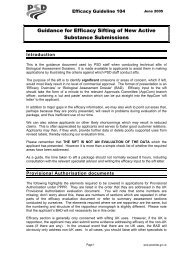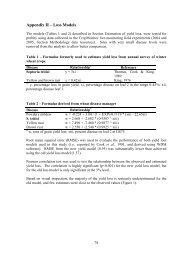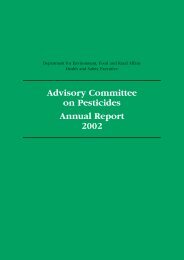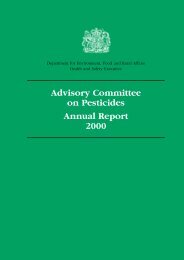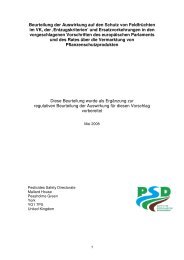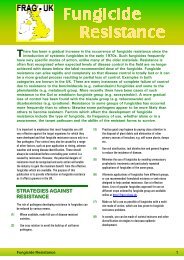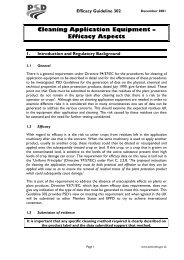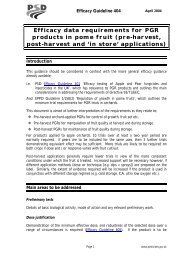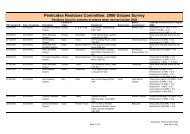Advisory Committee on Pesticides Annual Report 2001
ACP Annual Report 2001 - Pesticides Safety Directorate
ACP Annual Report 2001 - Pesticides Safety Directorate
You also want an ePaper? Increase the reach of your titles
YUMPU automatically turns print PDFs into web optimized ePapers that Google loves.
Secti<strong>on</strong> E: UK Review Programme<br />
operators in the agricultural sector. The c<strong>on</strong>sumpti<strong>on</strong> of produce already<br />
treated with dichlorvos (sourced from within or outside the UK) would not<br />
raise the same level of c<strong>on</strong>cern since the levels of dietary exposure (based<br />
<strong>on</strong> food residues m<strong>on</strong>itoring data) were c<strong>on</strong>sidered minimal.<br />
Alternatively, if COM c<strong>on</strong>cluded that dichlorvos was an in-vivo mutagen, but<br />
that the tumours observed in animal tests did not result from a genotoxic<br />
mechanism, or if it could not c<strong>on</strong>firm that dichlorvos was an in-vivo mutagen,<br />
or it took the view that dichlorvos was not an in-vivo mutagen, the ACP’s<br />
previous recommendati<strong>on</strong>s would be maintained.<br />
Following c<strong>on</strong>siderati<strong>on</strong> of all the available mutagenicity data, and comments<br />
from the data owners, the COM c<strong>on</strong>cluded that dichlorvos should be regarded<br />
as an in-vivo mutagen at site of c<strong>on</strong>tact, and that it could not exclude the<br />
possibility of it acting as a genotoxic carcinogen. It finalised a statement <strong>on</strong><br />
30 July <strong>2001</strong>. The ACP c<strong>on</strong>sidered the COM advice, and whilst they recognised<br />
that any risks from exposure would be low, they agreed that the possibility<br />
of genotoxic carcinogenicity could not be excluded. The <str<strong>on</strong>g>Committee</str<strong>on</strong>g> therefore<br />
recommended to Ministers that, as a precauti<strong>on</strong>ary measure, it would be<br />
prudent to revoke, with immediate effect, all agricultural and n<strong>on</strong>-agricultural<br />
uses of dichlorvos.<br />
45<br />
Before such regulatory acti<strong>on</strong> could be carried out, AMVAC Chemical UK Ltd<br />
(an approval holder) obtained an injuncti<strong>on</strong>, which prevented regulatory<br />
acti<strong>on</strong>. Government agencies were also prohibited from making any<br />
announcement to the public about the regulatory acti<strong>on</strong> that was proposed.<br />
The approval holder also gained permissi<strong>on</strong> for a judicial review, which was<br />
heard in November <strong>2001</strong>.<br />
The grounds for the challenge were that AMVAC had not been properly<br />
informed of the proposed regulatory acti<strong>on</strong> or the basis for it, and had not<br />
been given sufficient time to make representati<strong>on</strong>s. AMVAC also claimed that<br />
Ministers had not given proper regard to the precauti<strong>on</strong>ary principle and to<br />
the European C<strong>on</strong>venti<strong>on</strong> <strong>on</strong> Human Rights.<br />
The judgement of the Court was issued <strong>on</strong> 3 December <strong>2001</strong>. Mr Justice Crane<br />
rejected most of the company’s submissi<strong>on</strong>s, including those c<strong>on</strong>cerning the<br />
precauti<strong>on</strong>ary principle and the C<strong>on</strong>venti<strong>on</strong> <strong>on</strong> Human Rights. However, he<br />
ruled that the company had been given insufficient time to resp<strong>on</strong>d to the<br />
c<strong>on</strong>clusi<strong>on</strong>s of the Government’s expert advisers prior to regulatory acti<strong>on</strong><br />
being taken. He accepted that the matter was urgent but c<strong>on</strong>sidered that the<br />
claimant had now had full opportunity to present any further material.




